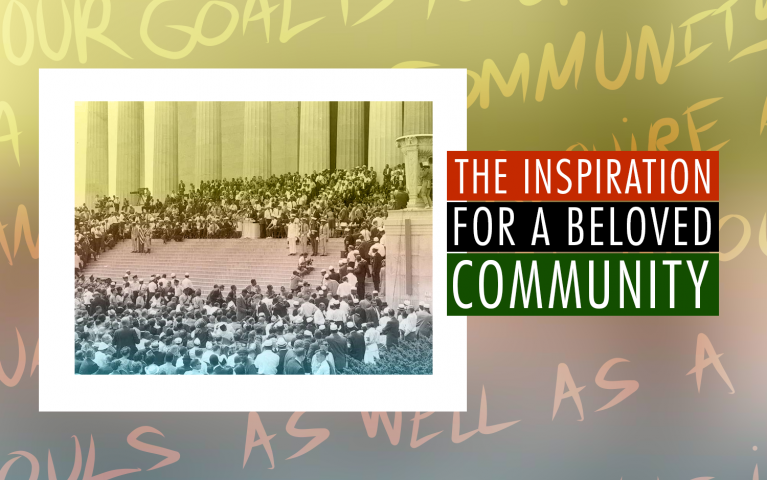The Inspiration for a Beloved Community

Even now, like the rest of the nation, we are called to do deeper work on the ways our mission and our institution are affected by racism.
We are all familiar with the powerful image of Dr. Martin Luther King, Jr., standing in front of the Lincoln Memorial on a hot August afternoon in 1963, stirring the nation with his poignant dream of an America free of racism. Unfortunately, many Americans have frozen Dr. King in that historical “I have a dream” moment where we can all feel inspired by a vision. But that vision demands wrenching work, and in the sixty ensuing years, it has become more elusive.
We revere Dr. King as a civil rights leader, but ignore or dismiss the broadening vision of social justice that he pursued in subsequent years. Consequently, many in this country were lulled into believing that we had in fact solved our national problem of racism.
Last summer’s events shattered any such illusion. They forced this country to look deeper, to dare ask tougher questions.
Dr. King continually looked deeper, pushed further. As tremendous as the civil rights accomplishments were, Dr. King knew that our national crisis was not limited to legalized segregation. He visited northern urban ghettos. He met with disenfranchised young Black men whose lives were marked by violence. He listened to Americans of all color struggling with economic survival. He heard the cries of victims of war on the other side of the planet and saw the effects of that war back home. Dr. King realized that the struggle to build genuine “Beloved Community,” which included economic justice and what he called a “revolution of values,” demanded courage and risk-taking – and not being satisfied with easy answers. He alienated many colleagues and followers when he spoke out against the Vietnam War in 1967 in an address that decried the three evils of racism, militarism, and materialism. In launching the Poor People’s Campaign in 1968, Dr. King recognized that a broader and more expansive movement would need to challenge the nation at a fundamental level.
In its 1957 launching statement, the Southern Christian Leadership Conference that Dr. King and others founded stated as its mission “to save the soul of America.” The earliest members of the Project HOME community, which included many persons with long experiences of living on the streets, recognized that what was at stake in the crisis of homelessness was, similarly, the soul of America. Solutions to homelessness required not only securing the appropriate housing and services, but it meant we had to confront a toxic blend of dehumanizing values and social, economic, and political systems built on racism, discrimination, and gross inequities.
And we grew – from shelter to housing, to creating access to healthcare and education, to working to provide greater economic opportunity. We have marched in the streets, spoken out in halls of power, invited people to reflect on societal norms, values, and priorities. We sought to bring people together from all walks of life. We have tried, along the way, to learn from Dr. King and the Freedom Movement, to keep rooted in core values while doing the strategic and concrete organizing and laboring to achieve our goals. We have glimpsed moments of Beloved Community, but also witnessed many instances of falling short. Our mission statement is, in effect, our dream and vision of what we want Project HOME to be. It is not yet. It keeps us at the work—looking deeper, pushing further.
Even now, like the rest of the nation, we are called to do deeper work on the ways our mission and our institution are affected by racism. Members of our community are gathering to ask tough questions and discern how we can function more authentically as a multi-racial “Beloved Community.” Our DEI (Diversity, Equity, and Inclusion) Steering Committee, comprised of elected staff members, is working specifically on how every voice can be heard. Our leadership is pushing itself to do deeper antiracist work. Staff and residents are engaging in conversations about what culture, policy, and governance changes are needed to make Project HOME a fully inclusive organization where everyone always feels heard and respected.
It is a big vision for any organization. It is struggle and work; pain and gift. We have begun this work here at Project HOME to transform the dynamics and roles that 400 years of racism has handed us, taking the next step toward that vision Dr. King always poignantly and powerfully evoked for us all—the beautiful and authentic Beloved Community for which we all yearn.